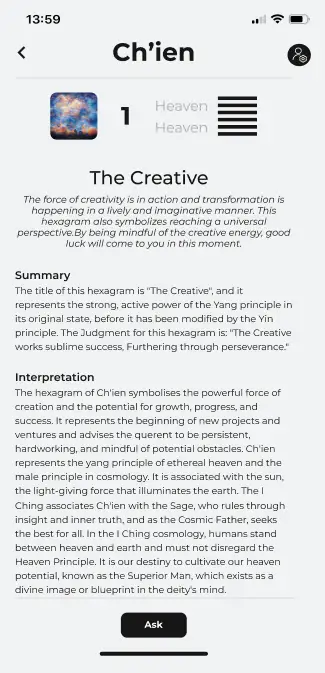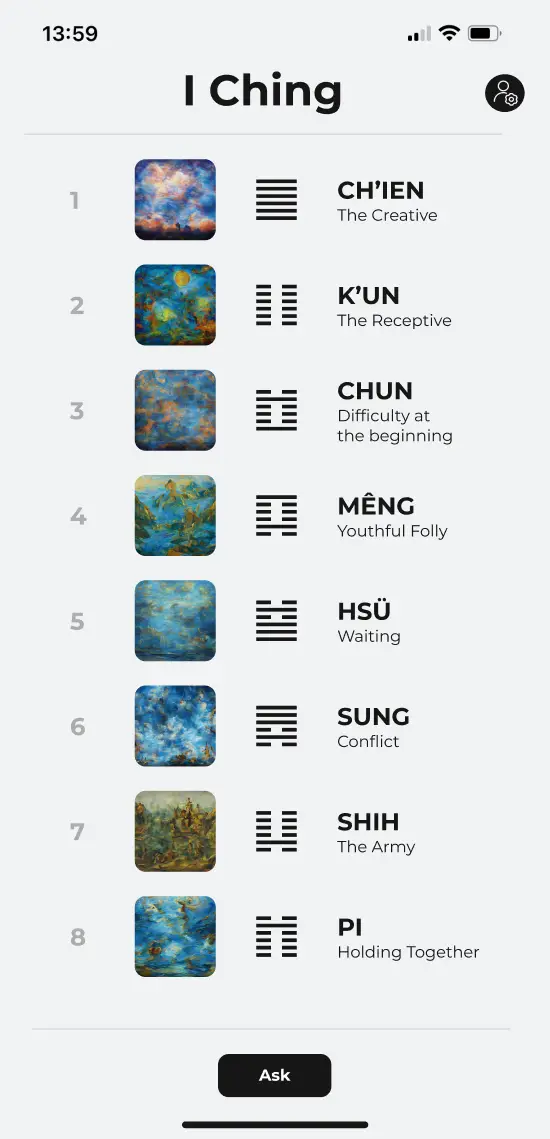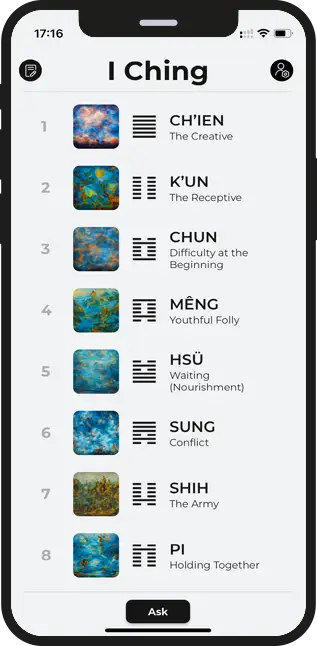
Wind
Lake
Hexagram 61 - Inner truth - CHUNG FU
Often, we know what the problem is, but we struggle to find the correct solution. We can reach the right solution through openness and gentleness. By being open-minded and receptive to different perspectives, we can expand our understanding and gain new insights that can help us arrive at the correct solution.
Summary
The central theme of this hexagram is inner truth and authenticity. It advises to be honest with oneself and to stay true to one's inner voice. The key takeaways from Judgment and Image are to be sincere and genuine in one's actions and mindful of one's internal motivations.
Interpretation
Hexagram 61, "Inner Truth," teaches us that receptivity to inner truth is the key to finding the correct solution to a problematic situation. This involves putting aside our prejudices and emotions and seeking to understand the positions of others while remaining balanced and open to learning. The hexagram emphasises the importance of honesty with oneself, staying true to one's inner voice, and being mindful of one's internal motivations. The I Ching advises against using anger and force in trying times, instead encouraging gentleness, understanding, and a desire to learn the lesson underneath.
The image of "pigs and fishes" in the hexagram refers to the stubbornness of the ego and the buildup of inner power through clinging to what is right. This power can penetrate even the most stubborn individuals but requires firmness and a lack of doubt to maintain. Accumulating knowledge of cosmic laws and a gradual self-correction process is necessary to attain the power of inner truth.
Inner truth cannot be used for personal gain or memorised as a mental construct. It must be grasped intuitively and confirmed experientially, becoming "knowledge of the heart." Meditation and openness are necessary to access the inner truth; the clarity it brings can unite others in agreement.
Overall, the hexagram reminds us to remain faithful to ourselves and to seek inner truth with openness and gentleness, allowing positive change to occur through understanding and receptivity.
Sage Advice
Following these principles can cultivate a deep sense of inner peace and fulfilment. The hexagram also suggests that to achieve inner truth, one must be willing to go through self-discovery and confront one's fears and weaknesses. This involves being honest with oneself about one's limitations and flaws and taking steps to address them. It also consists of developing a deep self-awareness and being mindful of one's thoughts, feelings, and actions.
Moreover, I Ching advises that one must maintain a sense of inner independence and self-sufficiency to achieve inner truth. This involves not being emotionally dependent on others and not allowing oneself to be swayed by external influences. Instead, one must cultivate inner strength and resilience and have the courage to follow one's path, even if it goes against the expectations of others. Be true to yourself, listen to your inner voice, and trust in your intuition. Doing so can cultivate a deep sense of inner peace and fulfilment, maintain integrity and authenticity in all aspects of life, and achieve success by aligning one's actions with one's internal values and principles.
Line 1
The best way to cultivate strength is by fully committing to what is good inwardly and outwardly. The first line warns against the dangers of secret designs, such as forming a faction with our ego or engaging in activities we know to be wrong. These types of isolated reservations of attitude can create a wall between ourselves and the truth or the Sage and undermine our connection with the Higher Power. The line advises us to search our innermost thoughts for any form of hedging, factionalism, or secret barriers that isolate us from unity with the truth and sacrifice them. Committing to serving the truth and maintaining our independence is crucial to achieving enduring unity with others and the Higher Power. The line also reminds us to be conscious of our attitudes and behaviour towards others, to avoid presumptuous and culturally decadent attitudes, and to embrace conscious innocence and humble dependence on the Cosmos. In essence, the line encourages us to examine ourselves for negative habits and let go of them before they cause a fall.
Line 2
To truly develop the power of inner truth, we must understand that our inner attitude is what people feel and know about us and that it communicates our level of emotional dependence or independence. In the second line, the image of a crane calling in the shade illustrates that our level of firmness or weakness in our values is apparent to others on an inner level. If we are not truly devoted to the truth, others will sense that we are separated from our source of strength and will test us. Therefore, it is essential to nourish ourselves with correct thoughts and values and constantly work on self-development. When we are devoted to higher things, and our values are firmly in place, others will feel our inner strength and positive influence. This line emphasises the importance of being authentic to oneself, as this will inevitably shine through to others.
Line 3
Reminds us of the importance of maintaining our inner independence and centre of gravity, regardless of the fluctuations in other people's attitudes or behaviours towards us. Emotional dependence on others can lead to a loss of balance and inner strength, and we should avoid defining the meaning of our lives or measuring our progress based on others' actions and thoughts. Instead, pursuing our path independently of others and events is the key to self-sufficiency and inner strength. To maintain our balance and negotiate the path successfully, we must rely on our inner truth and avoid becoming judgmental towards others.
Line 4
The moon is nearly full. This line refers to a time of great power and abundance. We are encouraged to recognise the source of this power, which comes from depending on the Higher Power, Fate, and time to work things out. It is crucial to avoid becoming too self-congratulatory and taking credit for our successes, as this can lead to a decline in our power. We must maintain our humility and remember that our strength comes from correctly relating to the Higher Power as its source. When we do this, we can continue to experience good fortune and abundance.
Line 5
Emphasises the importance of the power of inner truth and its ability to unify people, even in situations where our actions may appear to lead away from unity. When we cling steadfastly to our principles and maintain our inner independence, we develop an adamantine strength that can subdue the inferior elements in others. The concept of truth, which is often interchangeable with the idea of the Sage, is something we all know on the deepest level of our consciousness, even if we may hold it in doubt on the conscious level. Adhering to this inner body of truth can unify people, even in situations where our actions may appear to be leading away from unity. However, when we allow our ego to take control, and its worrying leads us to want and eagerness to push things to a conclusion, we lose the power of truth and its ability to help us and others. People who are morally correct and strict with themselves automatically draw respect from others, but their influence diminishes if they seek to be credited for their virtue. When a person becomes free of all vanity, the power of their personality is restored, and the distrust and suspicion that may have previously blocked their influence dissipate. In this way, the power of truth unites people. In practical terms, the fifth line suggests that our devotion to inner truth can create unity where there is currently chaos. By focusing on ourselves and correcting our actions, we can become a model for others. Doing so can gradually develop a culture of honesty, integrity, and inner strength. The key is to remain steadfast in our adherence to truth, even in situations where it may be difficult or uncomfortable. By doing this, we can inspire others to do the same, creating a more harmonious and unified world.
Line 6
True self-development cannot be achieved through force or coercion but through personal commitment and a willingness to learn and grow. We should not try to push our ideas onto others or rush their development but rather allow them to progress at their own pace. Our role is to provide guidance and point the way, but ultimately it is up to each individual to find their path. This line also reminds us of the power of our words and the importance of speaking with sincerity and integrity. We should be mindful of our words' impact on others, even in casual conversation. It is essential to cultivate a spirit of innocence, approaching others with an open mind and a willingness to listen rather than trying to impose our views on them. By doing so, we create an atmosphere of trust and respect that encourages others to open themselves up to new ideas and ways of thinking.








